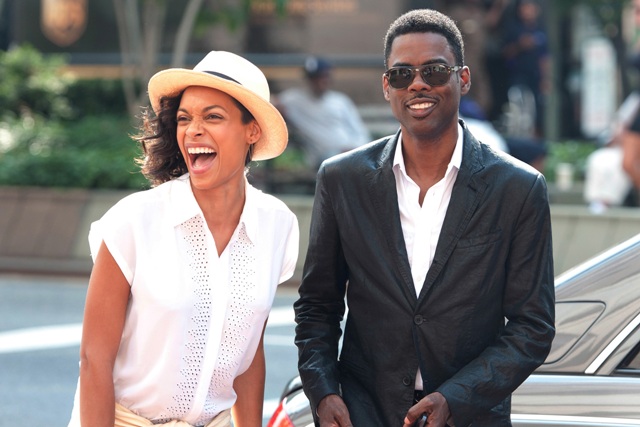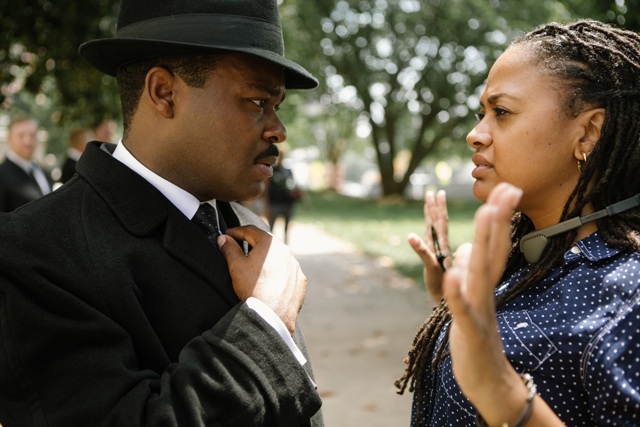MOVIE REVIEWS |
INTERVIEWS |
YOUTUBE |
NEWS
|
EDITORIALS | EVENTS |
AUDIO |
ESSAYS |
ARCHIVES |
CONTACT
|
PHOTOS |
COMING SOON|
EXAMINER.COM FILM ARTICLES
||HOME

Monday, February 2, 2015
THE YEAR IN FILM 2014
More A Series Of Events Than A True Film Year

Rosario
Dawson and Chris Rock in Mr. Rock's comedy-adventure "Top Five".
Paramount Pictures
by
Omar P.L. Moore/PopcornReel.com
 FOLLOW
FOLLOW
Monday,
February 2,
2015
The 2014 film year wasn't great by any stretch. Admittedly a poor year but
more than that, 2014 was a strange year for film. Many if not all of the
films, good or bad in 2014 seemed to happen beyond the big screen
rather than actually on it.
There was the arrest of an actress in Century City, California
for what was described as prostitution -- even
though Daniele Watts (of "Django
Unchained") and her white boyfriend merely did in public what any
couple of the same race often does in public: display affection. There was
the deaths of
Philip Seymour Hoffman and
Robin Williams, both found in dramatic fashion and deeply painful
circumstances. Both self-inflicted demises registered Richter-scale type
shocks in the film community and elsewhere.
Legends on and off the camera departed as well, including Maya Angelou, Lauren
Bacall, Ruby Dee and
Mike Nichols.
Jennifer Lawrence was one of many actors who had her private photos hacked.
She responded and
reclaimed her own autonomy and representation
better than any agent could. Sony Pictures was hacked to bits, accompanied
by the bizarre "Wag The Dog" corporate media theater surrounding their film "The
Interview" that even involved President Obama. It was all supremely weird.
To further Sony's catastrophe the emails of Scott Rudin and Sony co-chair Amy
Pascal exposed the kind of racist sentiment Hollywood power brokers, all of whom
are white, routinely harbor.
There were some who felt Renee Zellweger had hacked herself.
Ms. Zellweger's transformation was an endless topic across social media -- not
necessarily a place of order or reason but likely one borne more of often
justified (and "reasonable") social opprobrium. Ms. Zellweger, who has
appeared in few films since her Oscar winning work in "Cold Mountain" in 2004
looked very different. The discussion about the actor's notable
alteration, was one fueled partly by genuine interest and fascination. Yet
it was a discussion also fueled mainly by rank sexism and the idea that women
shouldn't be able to do what they choose with their faces or bodies.
"Selma"
was attacked for not having a white savior, or at least not shining a big
smiley-faced light on LBJ, even though the president appeared for less than
fifteen minutes in Ava DuVernay's
remarkable film. History shows LBJ for who he really was vis-a-vis Blacks
in America -- as slow to act on civil and human rights throughout his political
career. (Any number of books including Robert Caro's Means Of Ascent,
document this.)
The queasiness surrounding
Woody
Allen (who appeared as a pimp in
John Turturro's "Fading Gigolo") and
Bill Cosby
grew last year, particularly in the case of the latter. Mr. Cosby was
great in "Uptown Saturday Night" in 1974 and a catastrophe in "Ghost Dad" in
1990 (both directed by Sidney Poitier.) Yet throughout that time span and
beyond, America's favorite dad was very likely America's most notorious rapist.
Woman after woman after
woman, including
Beverly Johnson, came forward to speak about
the horrors of Dr. Hyde Huxtable.
Speaking of speaking,
Chris Rock, who directed the entertaining and
acclaimed 2014 comedy "Top Five",
spoke refreshingly and clearly about Hollywood's
overwhelming whiteness as an industry, a conviction backed by decades
of history (and January's Oscar nominations).
Anthony
Mackie, by contrast, has spoken in defense of the
Academy, most recently as
last month.
Each of these incidents, some strange, tragic or laughable, others outrageous,
were movies in and of themselves: larger than life, vivid and incredible.
Nearly all were more compelling and of greater interest than much of what we saw
on the big screen in 2014. The wedding of George Clooney and Amal
Alamuddin in 2014 attracted so much media attention, some of it negative, likely
sparked by jealousy, envy and even hate. (Their wedding got arguably as
much positive attention as the wedding of Prince William and Kate Middleton.)
I don't know if the aforementioned events felt like movies unto themselves
because they were or because the amount of 24-hour mainstream media news
attention paid to them felt like events tailored to the big screen.
The selfie taken by Bradley Cooper at the 2014 Oscars was
a movie that couldn't star enough Oscar winners. Millions
tweeted it worldwide. The selfie was seen more times than anything else on
the big screen, and for free. Besides Mr. Cooper's dexterous
cinematography it turns out that the selfie had a footprint: a producer named
Samsung.
Spectacle ruled the movie landscape in 2014. Big. Bigger.
Gleaming. Shiny. Empty. The artistic state of the state of
Hollywood film industry is weak despite staggering box office grosses. The
big-money making films are Hollywood's self-fulfilling prophecy: you give a lot
(publicity and advertising, big-budgets) to get a lot in return (huge box-office
returns). Often this process is a losing proposition.
In 2014 Hollywood further narrowed its scope, becoming a niche market, while
independent film, once considered niche, broadened its horizons ever more.
Tinseltown "niche" -- comic book superheroes, sequels, romantic comedies,
blockbusters -- often didn't work. You can count on one superhero finger
those that did ("Captain
America").

David Oyelowo and Ava DuVernay on the set of "Selma" last
year. Paramount
Pictures
Hollywood is in deep danger of hurriedly shunting itself into irrelevance film
quality-wise. America's greatest export industry is already at a
precipice. The Hollywood of the 1970s has long gone, never to return.
Through channels of entrenched sexism women in Hollywood remain invisible in
front of the camera (in any dimensional and fully-realized way) or behind the
camera. When just two studio films in 2014 had women (Ava
DuVernay and Angelina Jolie) directing them you know the system is in
dire shape. The dry, predictable route of big-budget film is robotic and
thoroughly rote, money-making or money-losing.
The Hollywood approach of global tent-pole (having films as franchises of their
own opening around the world simultaneously and building fulsome resources,
merchandising and expenses to promote them) is the model. By
contrast the independent film community continues to encourage innovation,
embrace diversity and invite dynamic points of entry. (AFFRM,
Netflix and many more in addition to Sundance, South By Southwest, Strand
Releasing, Magnolia, IFC Films, Sony Pictures Classics, Fox Searchlight.)
Day-and-date releasing, DVD and video-on-demand in the U.S., which began with
Steven Soderbergh's "Bubble" nine years ago, is now ubiquitous.
A number of established filmmakers returned to their native roots of
independence including
Spike Lee, who completed post-production of his
new film "Da Sweet Blood Of Jesus" early last year. The film, which opens
in U.S. theaters on February 13 and is presently on demand, was financed
entirely by crowd-sourcing funds raised on the
Kickstarter website. Long-standing great
directors like Jean-Luc Godard made "Goodbye To Language", which was lauded in a
few critical circles but little seen. (I myself have yet to see it.)
In some instances identity was at issue, specifically in how we as filmgoers
view race in portrayals on film. Race was one of the biggest parts of the
conversation in 2014. Chadwick Boseman was marvelous as James Brown.
In anticipation of Daniel Craig's eventual departure from the 007 franchise many
lobbied for
Idris Elba to play James Bond. Some
bristled. Mr. Elba took it all in stride
in his typically self-deprecating fashion.
Others, including some in the "fanboy" community, were offended that a
Black actor (John Boyega) could dare be seen in a
stormtrooper armor. These issues also cropped up with
portrayals in "The Hunger Games" not so long ago.
In a year of offscreen tragedies and devastations for Blacks, particularly Black
men,
Denzel Washington partially alleviated the
summer pain with a resounding authorship of big screen Black masculinity in
"The Equalizer",
one of the better, more gratifying Hollywood studio films of 2014.
Samuel L. Jackson challenged the dozens of fellow
celebrities who threw icewater over themselves for ALS research to
record videos singing for justice for people killed by racist police.
Tellingly, very few celebrities, and mostly Black celebrities if any, heeded
Samuel L. Jackson's December 13, 2014 call. The silence was deafening and
comments on Mr. Jackson's Facebook page often
insightful. Mr. Jackson sparked a dialogue but again, almost no recorded
videos were made and posted to show their solidarity.
Some white private citizens posted videos but
very few if any white celebrities who posted ALS icebucket videos also did
videos supporting ending violence by racist police.
Few if any white or Black celebrities, or fellow colleagues made videos in
support of Mr. Jackson's call. Some whites responding on Mr. Jackson's
Facebook page instead spent more time defending themselves against perceived
charges by them of being racist.
Admittedly I was surprised by Mr. Jackson. I had previously perceived him
as a reluctant figure regarding speaking out on injustice. He dispelled
any notions I had with his video post. Never will I look at him in that
"reluctant" light again.
Though Steve McQueen
made history as the first Black filmmaker to have a film win Best Picture at the
Oscars for "12 Years A Slave",
his historic win was an exception that proved a rule. Other filmmakers
delivered much-talked about and quality films that some, including myself,
hadn't seen.
Gina Prince-Bythewood,
Amma Asante,
Ana Lily Amirpour,
Jennifer Kelly, Laura Poitras and others had films that were there to be seen.
If they looked hard enough.
Cynicism and criticism marked the films that were seen in 2014. Some of
the admired movies ("Birdman"
and "Chef" for example)
were ones that took aim at critics in various disciplines. This is hardly
new in movies but in 2014 there appeared to be more of it, and in several other
films. "Boyhood",
"Selma" and
"The Grand Budapest Hotel" were extraordinarily
well-made films, as was "Under The Skin". The latter was seen by few in
the U.S. Even foreign language films, normally a bastion of reliable
strength, were in limited supply in 2014. At least the good ones: "Ida",
"Leviathan", "Force Majeure", "Timbuktu", "Wild Tales".
Many more things can be said about 2014 as a year in film. I don't know
where to begin, and if I did, you'd likely not want to read this. Perhaps
it's best to call 2014 a year of transition. But a transition to what,
exactly? Doom? Paradise? Erasure? Irrelevance?
(Especially in light of excellent TV productions.) Or a transition to a
new way to see, make and distribute film?
Time to fade to black and truly start the 2015 film year. After all: it is
February.
Also:
The Ten Best Films Of 2014
Also:
The Twelve Worst Films Of 2014
COPYRIGHT 2015. POPCORNREEL.COM. ALL RIGHTS RESERVED.  FOLLOW
FOLLOW
MOVIE REVIEWS |
INTERVIEWS |
YOUTUBE |
NEWS
|
EDITORIALS | EVENTS |
AUDIO |
ESSAYS |
ARCHIVES |
CONTACT
| PHOTOS |
COMING SOON|
EXAMINER.COM FILM ARTICLES
||HOME

 FOLLOW
TWEET
FOLLOW
TWEET
 FOLLOW
FOLLOW